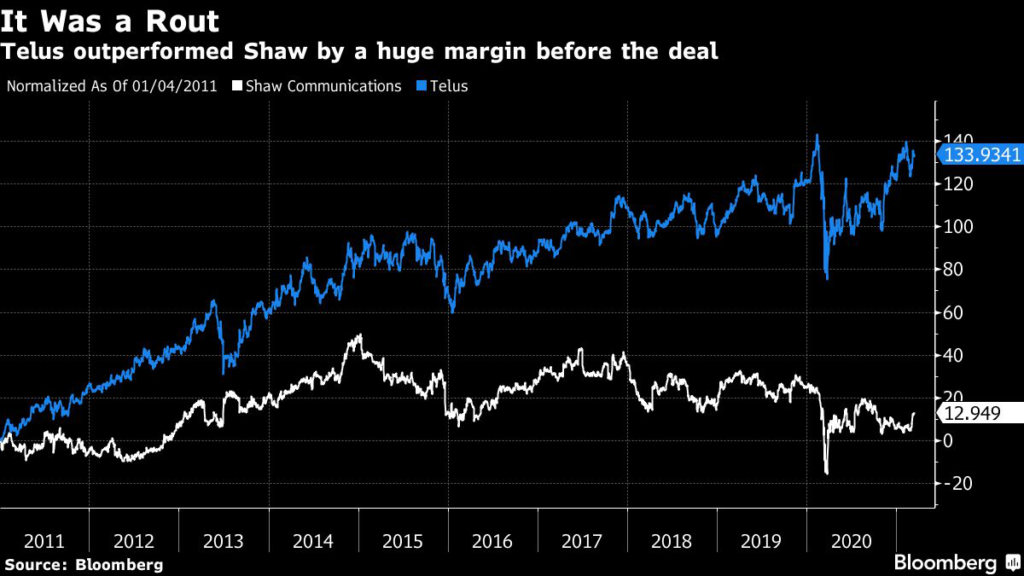A court case over one of Canada’s biggest-ever takeovers is near its end, after weeks of testimony that came to focus on a single question: Is Shaw Communications Inc. a great company or a broken one?
(Bloomberg) — A court case over one of Canada’s biggest-ever takeovers is near its end, after weeks of testimony that came to focus on a single question: Is Shaw Communications Inc. a great company or a broken one?
The nation’s antitrust watchdog is fighting to block Shaw’s sale to Rogers Communications Inc., arguing that to consumers, Shaw is an irreplaceable force for good — a “disruptive” and “maverick” firm that has helped drive down prices in a country known for expensive cell-phone bills.
Shaw executives, one after another, testified that their company was, in fact, about to hit a wall. It’s been cornered by larger competitors and its share price had flatlined for eight years before the Rogers family offered a way out. On the witness stand, Shaw’s chief financial officer said bluntly: “We just didn’t see a viable path forward as a standalone company.”
The legal battle over the C$20 billion ($14.7 billion) deal will be settled within weeks, possibly days. Merger-arbitrage traders who’ve been watching the case for months may be in line for rich gains if the Competition Tribunal, Canada’s merger court, allows it to proceed. Shaw closed Monday almost 10% below the Rogers offer of C$40.50 per share; the discount has narrowed since the trial began, as it became apparent that lawyers for the companies were getting some traction.
Power shift
At stake is a massive reshuffling of power within Canada’s communications industry. If the deal goes ahead, Toronto-based Rogers will assume control of one of largest networks providing home internet and cable television in the western provinces, becoming a national firm to rival the sector’s no. 1 player, BCE Inc. Most of Shaw’s wireless business would be sold off to Montreal-based Quebecor Inc., turning it into a fourth player to challenge Rogers, BCE and Telus Corp.
The parties are set to square off one more time for final arguments Tuesday and Wednesday. A ruling may come before Christmas, though that timeline is not guaranteed.
“My base case is the deal will be approved. I think a closing before year-end is possible, but seems a bit aggressive to me,” Jerome Dubreuil, an analyst at Desjardins Securities, said by phone.
The trial has drawn some of the biggest names in Canadian corporate law. Overseeing it is Chief Justice Paul Crampton, the top judge in the Federal Court of Canada and head of a three-person panel that has to decide whether the deal is so harmful to competition that it needs to be blocked.
Many experts say legal precedent runs in Rogers and Shaw’s favor.
The heart of the Competition Bureau’s case is that the deal represents such a dramatic, anti-competitive change that it warrants a rare court intervention to stop the deal. The billionaire Rogers and Shaw families are the beneficiaries, the antitrust body argued, at the expense of low-income earners who rely on affordable wireless services that Shaw’s Freedom Mobile division offers in three of Canada’s four largest provinces.
The companies, on the other hand, have built a case that the merger is “pro-competitive.” If Shaw was failing — and the numbers say it has lost significant market share in Western Canada to its larger rival, Telus — then allowing the Shaw family to sell out to stronger players like Rogers and Quebecor will improve competition and choice.
At times, the weekslong trial has descended into a university economics lecture, as expert witnesses fought about price elasticity, competitive effects, taxes and income distribution. “There’s a theater of math element here,” said Keldon Bester, a fellow at the Center for International Governance Innovation and a former special adviser to the Competition Bureau.
Read More: Rogers Lawyer Rips ‘Waste’ as Antitrust Czar Digs In for a Fight
“The general consensus among experts seems to be that the Competition Bureau is fighting a losing battle, but they’ve made good arguments,” said Ben Klass, an Ottawa-based researcher in telecommunications policy. “They’ve brought a substantial amount of evidence. They’ve levied substantial criticisms against the evidence brought by the companies. They didn’t just go in there with their pants around their ankles.”
Final hurdles
If the tribunal allows the merger to go ahead, the companies would need only need one final level of approval from Industry Minister Francois-Philippe Champagne, who appeared to signal support in October by publicly spelling out the conditions under which he would agree to allow Quebecor to buy up Shaw’s wireless licenses.
Before it gets to that, however, there’s another possibility. The Competition Bureau, if it loses its case, could try to appeal, bringing another delay to a deal that was announced in March 2021.
“We don’t think it serves the companies, the industry or consumers/businesses out west to have the CB potentially extend the regulatory review process further into the future,” National Bank of Canada analyst Adam Shine said in a note to clients.
More stories like this are available on bloomberg.com
©2022 Bloomberg L.P.










